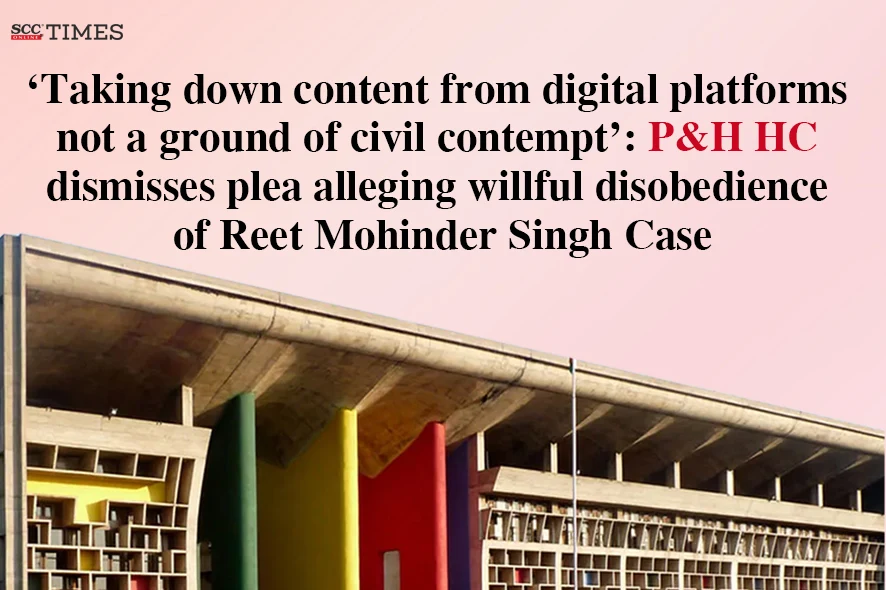Punjab and Haryana High Court: In the present case, a contempt petition was filed by a young advocate (‘petitioner’) alleging willful disobedience of the judgment rendered by the Division Bench of this Court in Reet Mohinder Singh v. State of Punjab, 2019 SCC OnLine P&H 7001 (‘Reet Mohinder Singh Case’). A Single Judge Bench of Sudeepti Sharma, J., held that the petitioner seeking to take down content from digital platforms, was beyond four corners of Reet Mohinder Singh Case (supra) as it addressed the menace of noise pollution and did not touch the ambit of regulating the hosting or transmission of online content. Thus, it was not a ground of civil contempt. The Court dismissed the petition and cautioned the petitioner to exercise due care in future.
The petitioner contended that songs glorifying violence, drugs and liquor continued to be played at marriage functions, clubs, discotheques and public events, and that such content remained readily available on online platforms like YouTube, Apple Music, JioSaavn, Wynk Music and Spotify despite Reet Mohinder Singh Case (supra).
The Court stated that the directions provided by Reet Mohinder Singh Case (supra) were to regulate the use of loudspeakers, public-address systems and sound-amplifying devices in physical spaces and it laid down temporal restrictions, casted monitoring and enforcement obligations on the State machinery. Further, considering that it was well-settled that contempt jurisdiction was quasi-criminal, the Court held that the standard of proof was high, and presumptions could not substitute proof.
The Court further opined that it was trite law that contempt was not a vehicle to expand or re-write an order or to conduct a roving enquiry into generalized non-compliance. Thus, the Court found the petition deficient on foundational facts as no specific instance such as the date, venue, event, or the identity of the persons or authorities where the directions were violated had been placed on record. Further, the Court stated that the petitioner had not identified any live show or public event in which such songs were played, nor any responsible officer who, despite knowledge, failed to act.
Taking into account the petitioner’s principal grievance regarding availability of songs on digital platforms, the Court observed that Reet Mohinder Singh Case (supra) had addressed the menace of noise pollution by ensuring enforcement of the Noise Pollution (Regulation and Control) Rules, 2000 and had not touched the ambit of regulating the hosting or transmission of online content.
Further, the Court stated that seeking to take down content from digital platforms was beyond four corners of the said judgement and was not a ground of civil contempt. Accordingly, the Court dismissed the contempt petition and held that it was devoid of merit and was not maintainable in law as the petitioner failed to establish any instance of willful and deliberate disobedience of Reet Mohinder Singh Case (supra).
The Court, after considering that petitioner was a young member of the Bar and that costs would unduly prejudice him, refrained from imposing costs even though it was inclined to impose the same for filing a misconceived contempt petition. The Court, however, cautioned him to exercise due care in future.
[Hardik Ahluwalia v. Gaurav Yadav, 2025 SCC OnLine P&H 7432, decided on 2-9-2025]
Advocates who appeared in this case:
For the Petitioner: Hardik Ahluwalia, Advocate
For the Respondents: Jaivir S. Chandail, Advocate, Ravneet Singh Joshi, DAG, Punjab and Harish Nain, AAG, Haryana


